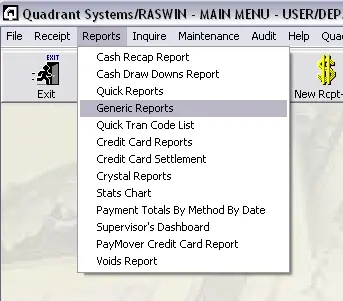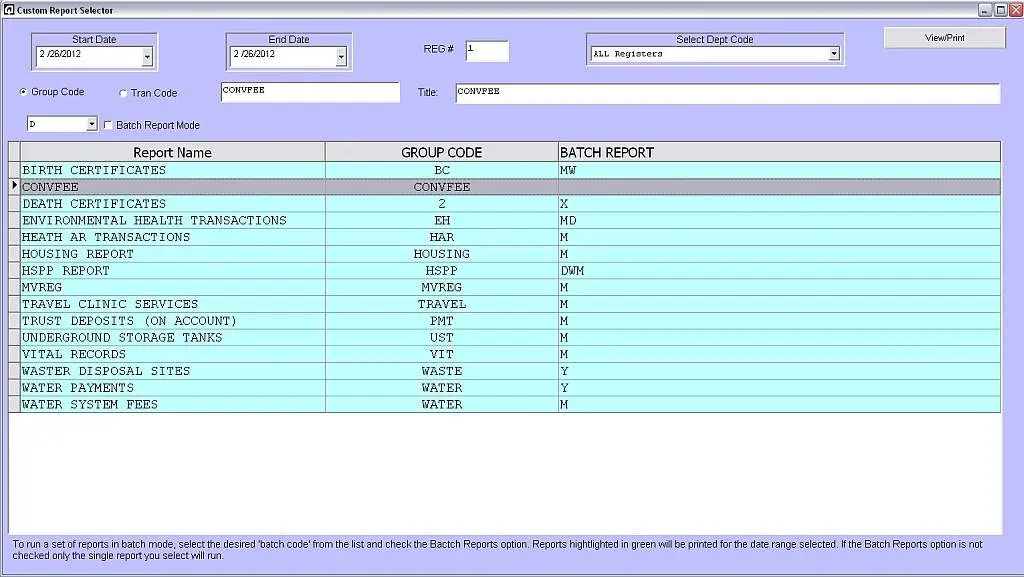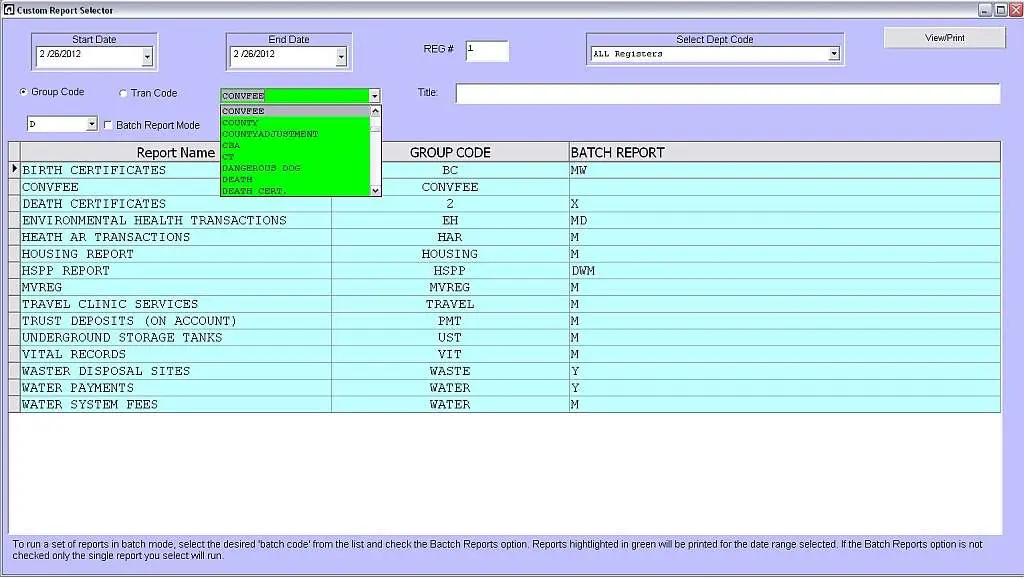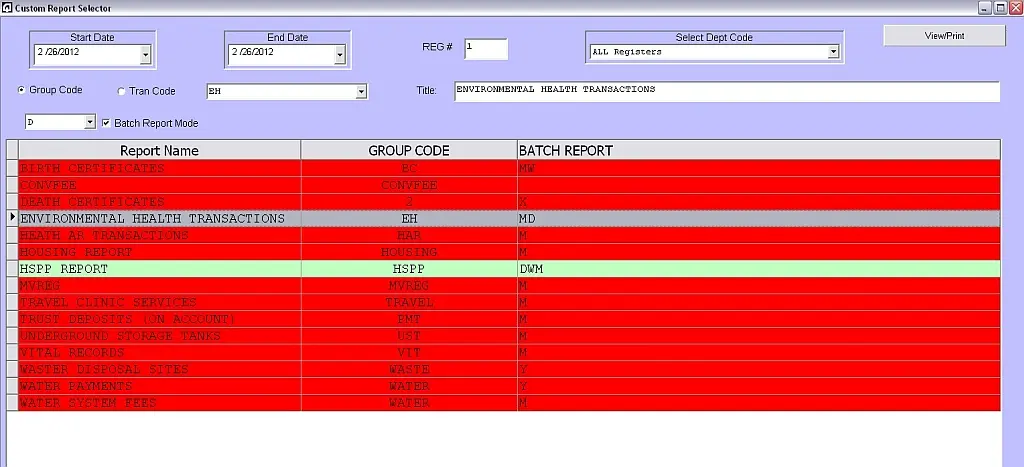Section 11
Generic Custom Report
This report allows you to list transactions for a group of
transaction codes for any
user entered date range desired, and for any single register,
or for all registers, or
for all registers in a single department. By default, the
selected group of registers is
ALL REGISTERS.
The report names table defines which reports are
available to you, but you can also generate a report for a
single GROUP CODE or TRAN CODE 'on the fly'
if you don't have a pre-defined report created already.
This section of the manual describes how to run these reports
once you
have created them once you have set them up as description in
Table maintenance section .
Basic Report

The following screen will be displayed:

Click on one of the report names shown in the list
RASWIN will fill in the selected group code and report
name
in the
boxes just above the selection grid. Note that the 'group
code'
option
will automatically be checked. In this example, the CONVFEE
report
was
selected, so that is the name of the GROUP CODE and TITLE that
has
been
filled in.
By default, the date displayed in the Start and End date
selection
areas will
be the current ACCOUNTING DATE. You can adjust these as needed
for
your report.
When you are
done, click the VIEW/PRINT and the report will be created and
displayed. From
there you can print it by clicking on the Print button on the
screen.
GroupCode or TranCode Mode
When the selection screen is loaded, RASWIN will load the
valid GROUP CODES from the
TRANCODES TABLE and put them into a drop down list, as shown
below. If you click on the TRANCODE option

When the cursor enters the GROUP CODE/TRAN CODE selector box,
the list will drop down and you can scroll to one of the valid
codes, or you can type in the first few characters and it will
scroll to that area of the list. (They are arranged in
alphabetical/numeric order for ease of locating them.)
When the cursor exits the field (either by tabbing over to the
report TITLE field or by clicking on it)
the currently selected value (GROUP CODE or TRAN CODE) will be
the
one selected and the
drop down list will roll-up and out of view. RASWIN will
automatically enter a report name based
on the group code or tran code you select. It will include the
date or range of dates selected,
and will be printed at the top of the report when it is
displayed
in your default browser (e.g, IE, Chrome, Edge, FireFox, etc.)
At that point, you will click on the View/Print button and the
system will search the database for items
that match your selection criteria (date range, and either the
group code or tran code that you selected). If
nothing is found a message box will inform you of this
situation
and you can adjust your criteria.
Batch Mode
If you want to run a group of several reports with a single
request, you can do this easily by simply
placing the predefined reports in 'batch group[s]'.
Note that the selection screen has a BATCH
REPORT column. If you have included BATCH CODES
predefined report names these will be shown in this column.
Note
that the batch code column can contain multiple
defined as 'M' (Monthly), some are 'Y' (yearly) and others are
in
several categories (e.g., 'DWM'...Daily, Weekly, Monthly).

To run the batch reports for a given group, check the 'BATCH
REPORT MODE' option. Then select the desired batch group code
from the drop down list. Only valid batch codes will be listed
in
this list. In the example shown
below the D group (Daily) is selected so only reports that are
in
the D group are highlighted in green ... these will be
the reports that run. The red items will not be run, since
they
are not part of the D group reports.

To start the batch process just click on any one of the green
items and then on VIEW/PRINT. The program will use your
selected
date range and register #['s] and generate preview pages for
each
report and display them in your default web browser from which
they
can be printed if desired.
Keep in mind that if you
have a large number of reports defined for a single batch
group,
(e.g., M for monthly) they may not all appear on the single
display page, but they will be included in the list of reports
to be generated.
Also, just because the group code is defined as M does not
mean that you must use a specific monthly period (for example,
Jan 1 to Jan 31). The data range you enter is not connected in
any way to the name of the batch group; so you could run the
daily reports for a single day or for 2 days or 100 days or an
entire yearly period if you need to.

 The following screen will be displayed:
The following screen will be displayed:
 Click on one of the report names shown in the list
RASWIN will fill in the selected group code and report
name
in the
boxes just above the selection grid. Note that the 'group
code'
option
will automatically be checked. In this example, the CONVFEE
report
was
selected, so that is the name of the GROUP CODE and TITLE that
has
been
filled in.
Click on one of the report names shown in the list
RASWIN will fill in the selected group code and report
name
in the
boxes just above the selection grid. Note that the 'group
code'
option
will automatically be checked. In this example, the CONVFEE
report
was
selected, so that is the name of the GROUP CODE and TITLE that
has
been
filled in.
 When the cursor enters the GROUP CODE/TRAN CODE selector box,
the list will drop down and you can scroll to one of the valid
codes, or you can type in the first few characters and it will
scroll to that area of the list. (They are arranged in
alphabetical/numeric order for ease of locating them.)
When the cursor enters the GROUP CODE/TRAN CODE selector box,
the list will drop down and you can scroll to one of the valid
codes, or you can type in the first few characters and it will
scroll to that area of the list. (They are arranged in
alphabetical/numeric order for ease of locating them.)
 To run the batch reports for a given group, check the 'BATCH
REPORT MODE' option. Then select the desired batch group code
from the drop down list. Only valid batch codes will be listed
in
this list. In the example shown
below the D group (Daily) is selected so only reports that are
in
the D group are highlighted in green ... these will be
the reports that run. The red items will not be run, since
they
are not part of the D group reports.
To run the batch reports for a given group, check the 'BATCH
REPORT MODE' option. Then select the desired batch group code
from the drop down list. Only valid batch codes will be listed
in
this list. In the example shown
below the D group (Daily) is selected so only reports that are
in
the D group are highlighted in green ... these will be
the reports that run. The red items will not be run, since
they
are not part of the D group reports.
 To start the batch process just click on any one of the green
items and then on VIEW/PRINT. The program will use your
selected
date range and register #['s] and generate preview pages for
each
report and display them in your default web browser from which
they
can be printed if desired.
To start the batch process just click on any one of the green
items and then on VIEW/PRINT. The program will use your
selected
date range and register #['s] and generate preview pages for
each
report and display them in your default web browser from which
they
can be printed if desired.